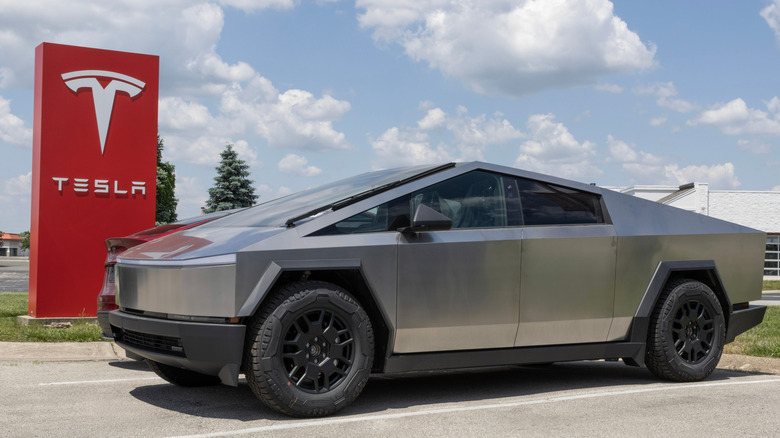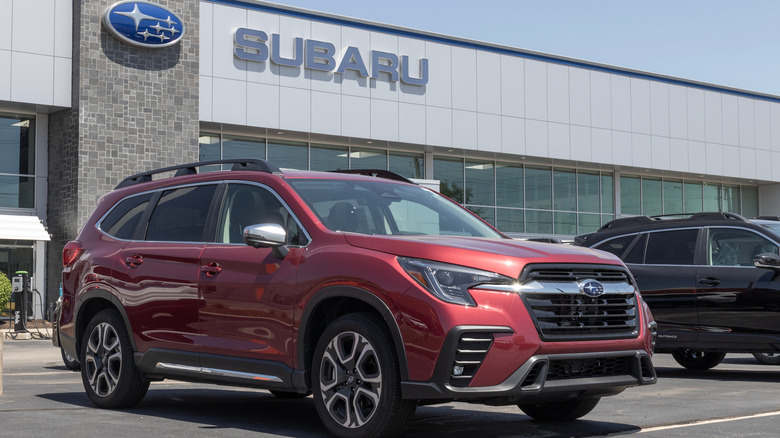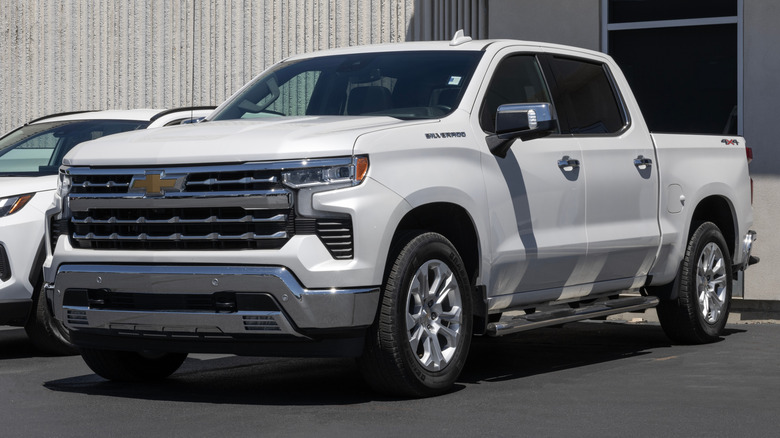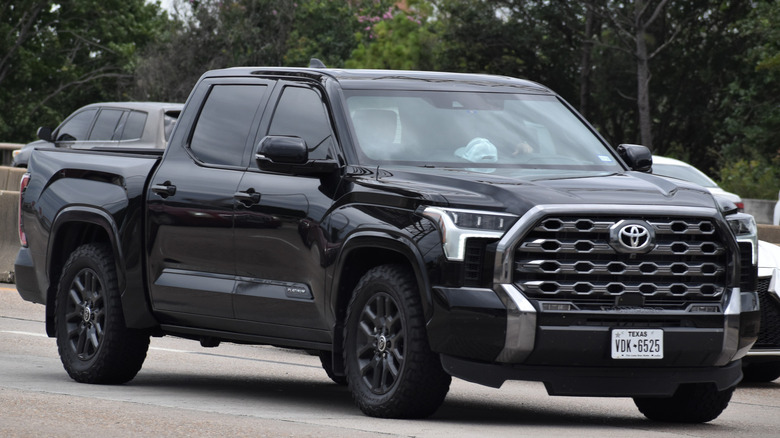The Biggest Powertrain Recalls In Recent History
In January 2025, Tesla began to notify Cybertruck owners of yet another recall. According to the National Highway Traffic Safety Administration (NHTSA), this is the seventh recall the controversial vehicle has suffered in its short tenure — not a great record for a vehicle that was only launched in November 2023. The latest instance concerns a powertrain issue, and 2,431 vehicles are potentially affected. More specifically, a fault in the drive inverter could cut power to the wheels.
While the Cybertruck has an unenviable reputation for recalls, Tesla can take some comfort in knowing that it's far from being alone when it comes to powertrain recalls. For instance, since 2010, Ford has been the biggest culprit, with a total of 545 recalls, of which 15% are attributed to the powertrain. This includes the recall of more than 550,000 F-150 trucks manufactured in 2014 with serious powertrain problems, but the Ford and Tesla are far from being the only instances of powertrain problems that triggered vehicle recalls. As we'll see, powertrain issues have triggered some of the biggest and most consequential vehicle recalls in recent history.
2014 Ford F-150 truck unexpected downshift: 552,188 vehicles
It says something about the seriousness of a recall when the NHTSA warns that affected vehicles should not be driven. The 2014 iteration of the Ford F-150 range is one such case. with the NHTSA listing accompanied by the warning–"URGENT: DO NOT DRIVE THIS VEHICLE" in bold text. It goes on to say that if your vehicle is part of the recall, then Ford has recommended that you stop driving this vehicle immediately. The recall was issued on June 17, 2024, and was triggered by a powertrain fault that can cause the vehicle to downshift into first gear unexpectedly. When this happens it can cause the rear tires to slide until the truck has slowed down, which increases the risk of a crash. Aside from personal danger, such an abrupt shift isn't going to do the engine or gearbox any favors.
The problem is caused by a loss of signal between the powertrain control module and the transmission output shaft speed (OSS) sensor. The OSS sensor is the culprit, as it can develop an intermittent fault. If this happens the Powertrain Control Module (PCM) believes the vehicle is moving slowly and downshifts to first gear. The fix involves updating the PCM software to prevent this from happening when the OSS sensor is faulty. As part of the solution, dealers will also run diagnostics on vehicle transmission to determine if any damage has been caused and to perform repairs if required.
Subaru Ascent, Outback, and Legacy: 198,255 vehicles
Next up is Subaru, with 198,255 potentially affected vehicles. The recall is due to drive chains suffering from excess wear to the point that they can break. However, the problem is not with the drive chain itself but a software fault in the Transmission Control Unit (TCU). More specifically, a programming error allows the clutch to engage before the drive chain is clamped, making it prone to slippage. This leads to increased wear, added stress, and, ultimately, the risk of complete failure. The problem occurs when drive or reverse gears are selected as soon as the engine has started, circumstances that can hardly be described as unusual.
The affected models include Subaru Ascents manufactured in 2019 and 2020 (160,941 vehicles), the 2020 Outback model (35,257 vehicles), and, to a lesser extent, the 2020 Legacy model with 2,057 recalls. The fix involves reprogramming the TCU and inspecting the chain guide and module data for indications of the chain having slipped. In these cases, the entire transmission will be replaced.
Volkswagen diesel vehicles: Up to 11 million vehicles
This one is an outlier as it isn't down to some problem with the powertrain. Rather, the recall was triggered by what can only be described as dubious practices by Volkswagen, with the resulting recall covering potentially 11 million diesel-powered vehicles worldwide, 550,000 of which were in the US alone. Ultimately, we're looking at software again and its role in the now-infamous Dieselgate scandal. However, in this instance, it's not a programming error or a rogue reaction to sensor input; instead, it's a case of software manipulation.
At the heart of the recall was a software function that could detect when an engine was running under emissions test conditions. When this scenario was detected, the engines ran in such a mode that nitrogen oxide emissions were within legal limits. Without this mode active, the same emissions could be as high as 40 times the legal limit. The scandal affected a wide range of VW, Audi, and Porsche models. The affected engines were the 2.0-liter and the 3.0-liter V6 diesel engines. For VW owners who wanted to keep their cars, a software fix and hardware modification was required on pre-2105 models. Later models only required a software update. Ultimately, the scandal cost VW a $14.7 billion settlement and a massive loss of consumer trust that it's still trying to recover from today.
General Motors: 463,295 vehicles affected
The fact that every recall we've covered up to now has been software-driven says much about the complexities of modern vehicles. So, just to show that hardware still has a part to play in recalls, let's turn our attention to GM. This recall affects 463,295 vehicles, including certain 2020-2022 Chevrolet Silverado, Cadillac Escalade, and GMC Yukon models.
The recall is due to a faulty transmission control valve that could fail and potentially lock up the rear axle. As noted on the NHTSA website, this can increase the risk of a crash. In this instance, software is not the culprit; instead, it can be described as the knight in shining armor. The fix includes installing new transmission control "remedy software" that is programmed to identify defective control valves. The new transmission control module software is free of charge, as is the replacement of faulty valves when the software fix flags them as being defective.
Toyota and Lexus: 102,902 vehicles affected
Finally, let's get into the nitty-gritty of Toyota's V35A engine recall. This recall covers Toyota Tundra and Lexus LX600 vehicles that are fitted with certain configurations of the aforementioned V35A engine. The configuration in question is a specific version that contains bearings that allow the crankshaft to rotate within the engine assembly when it's running. The issue isn't about the mechanics or engineering of this configuration. Rather, the recall covers an issue where debris from machining wasn't cleared during manufacturing, which can adhere to bearings with the expected results.
According to the NHTSA, the effects of this fault include engine knocking, rough running, engine stall, and failure to start. The fault prompted Toyota to conduct a voluntary recall of potentially affected vehicles and began to notify drivers in mid-2024. The company offered free repairs on all affected vehicles, including inspections and, if necessary, complete engine replacements.





